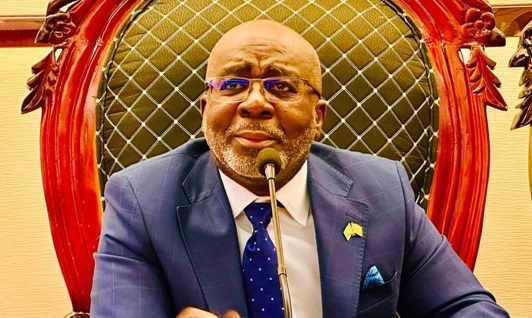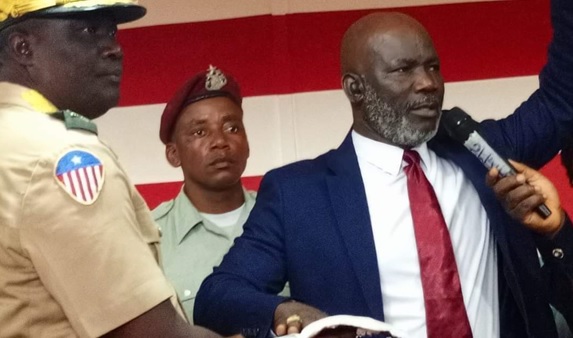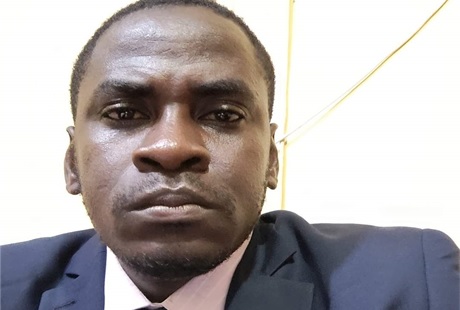MONROVIA, LIBERIA – Embattled Speaker of the House of Representatives, J. Fonati Koffa, has filed a petition with the Supreme Court, challenging what he describes as unconstitutional and illegal actions taken by members of the House’s majority bloc. The petition comes in the wake of a controversial move by the majority bloc to elect Montserrado District 11 Representative Richard Nagbe Koon as the new Speaker. This decision followed a resolution signed by the bloc to oust Koffa from his position, a move Koffa argues flagrantly violates the Liberian Constitution and House Standing Rules.
Koffa’s legal challenge primarily revolves around the legitimacy of the plenary session during which Koon was elected. According to the Speaker, this session was convened without his authorization or presence, a clear violation of Article 49 of the Liberian Constitution and Rule 10 of the House Standing Rules. These provisions, Koffa asserts, grant him exclusive authority to call and preside over legislative sessions, making the actions of the majority bloc unconstitutional and procedurally invalid.
The petition further highlights the suspension of three lawmakers—Representatives Edward Flomo, Abu Kamara, and Marvin Cole—by the majority bloc. Koffa argues that these suspensions were carried out without due process, a requirement firmly enshrined in Article 20 of the Liberian Constitution. The Speaker also references Rule 48 of the House Standing Rules, which mandates adherence to due process in disciplinary actions against lawmakers. By bypassing these constitutional safeguards, Koffa contends, the majority bloc has undermined the principles of fairness and accountability.
Another key point in Koffa’s petition is the restructuring and reconstitution of statutory committees, which he claims were carried out in violation of established rules. According to Koffa, committee chairs and co-chairs are appointed for three-year terms and can only be removed by a two-thirds majority vote of the House membership. The recent actions by the majority bloc to overhaul these committees, he argues, not only disregard this rule but also disrupt the functioning of the legislature.
The controversy also extends to the handling of the 2025 Draft National Budget. Koffa accuses Deputy Speaker Thomas Fallah and other members of the majority bloc of unlawfully seizing the budget, which was addressed to him in his capacity as Speaker. By doing so, he argues, the bloc has violated established legislative protocols and the constitutional mandate outlined in Article 49. This act, he insists, represents a deliberate attempt to usurp his authority and undermine the office of the Speaker.
In his petition, Koffa emphasizes the critical role of the Supreme Court as the ultimate arbiter of constitutional disputes in Liberia. Citing Article 66 of the Constitution, which grants the Court the authority to resolve such matters, Koffa has called for judicial intervention to restore constitutional order. His legal team has asked the Court to declare all actions taken by the majority bloc as null and void, arguing that these measures erode the rule of law and the integrity of the legislative process.
Koffa’s petition also raises broader questions about the procedures for removing a Speaker from office. According to Article 49 of the Constitution, the removal of a Speaker requires not only a two-thirds majority vote of the House membership but also adherence to due process through a formal hearing. Koffa asserts that none of these requirements were met in his case, rendering his removal illegal and his position as Speaker intact.
The Speaker has described the actions of the majority bloc as a coordinated effort to undermine his authority and disrupt the legislative process. “The constitutional authority vested in me as Speaker cannot be usurped or replaced without adherence to the law,” he argued in his submission to the Supreme Court. He maintains that he remains the legitimate Speaker and that any attempts to remove him without following constitutional procedures should be rejected by the Court.
The ongoing dispute has exposed deep divisions within Liberia’s 55th Legislature, with significant implications for the country’s governance and political stability. The actions of the majority bloc, combined with Koffa’s legal challenge, have created a tense standoff that could shape the future of legislative leadership in Liberia.
Observers have noted that the controversy has broader implications for Liberia’s political landscape. With the Speaker’s position at the center of legislative decision-making, the outcome of this case could influence how power is distributed and exercised within the legislature. It also raises critical questions about the commitment of lawmakers to uphold constitutional principles and democratic norms.
The standoff has also drawn significant public attention, with citizens and civil society groups expressing concern about the impact of the dispute on legislative effectiveness. Many have called for a resolution that prioritizes the rule of law and respects the constitutional framework that underpins Liberia’s democracy.
Koffa’s petition has also highlighted the role of the judiciary in resolving political disputes and safeguarding constitutional order. As the Supreme Court considers the case, it faces the challenging task of balancing legal interpretation with the broader political implications of its decision. The Court’s ruling will not only determine the legitimacy of Koffa’s removal but also set a precedent for addressing similar disputes in the future.
The Speaker’s legal challenge has been supported by several lawmakers who view the actions of the majority bloc as a dangerous precedent. These allies have argued that the dispute is not just about Koffa’s position but about defending the principles of accountability and transparency in legislative governance.
Meanwhile, members of the majority bloc have defended their actions as necessary to restore order and efficiency in the House. They argue that Koffa’s leadership has been marked by partisanship and inefficiency, making his removal essential for the legislature to fulfill its responsibilities.
As the nation awaits the Supreme Court’s ruling, the stakes remain high. The decision will not only shape the immediate future of legislative leadership but also influence Liberia’s broader political trajectory. For Koffa, the legal battle represents a fight to defend the authority of his office and uphold the rule of law. For the majority bloc, it is an opportunity to assert their dominance and redefine legislative power dynamics.
This legal showdown is poised to be a defining moment for Liberia’s governance, testing the resilience of its institutions and the commitment of its leaders to constitutional principles. As the country watches closely, the Supreme Court’s decision could have far-reaching consequences for the stability and credibility of Liberia’s democratic system.







